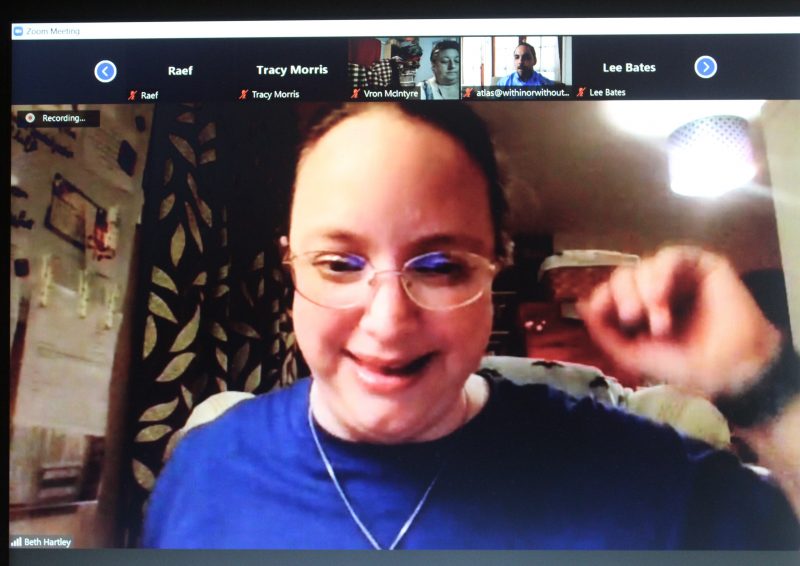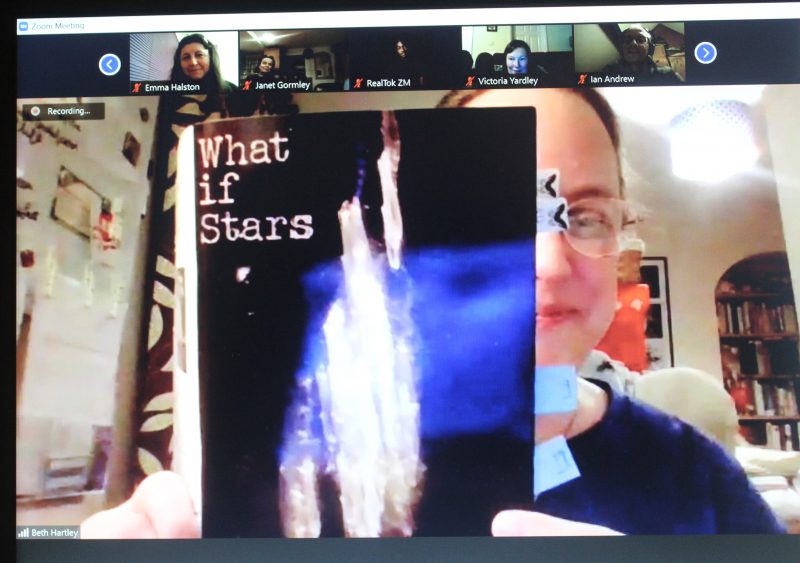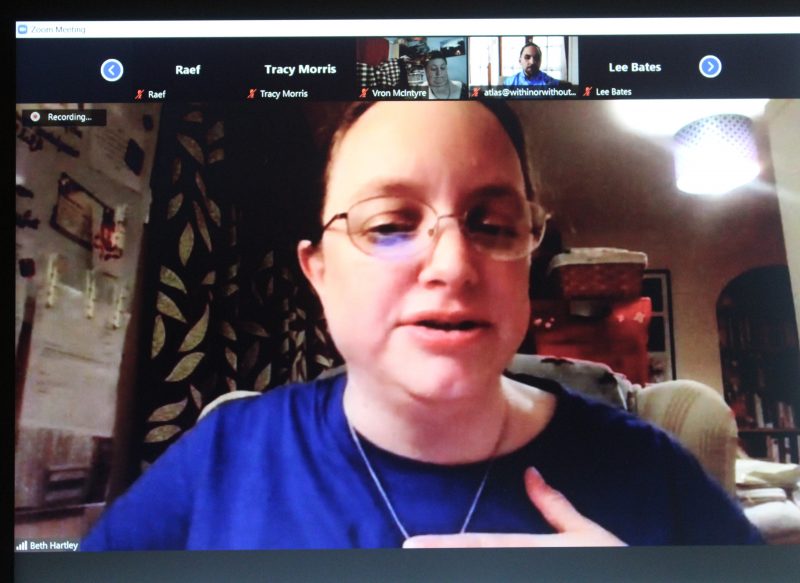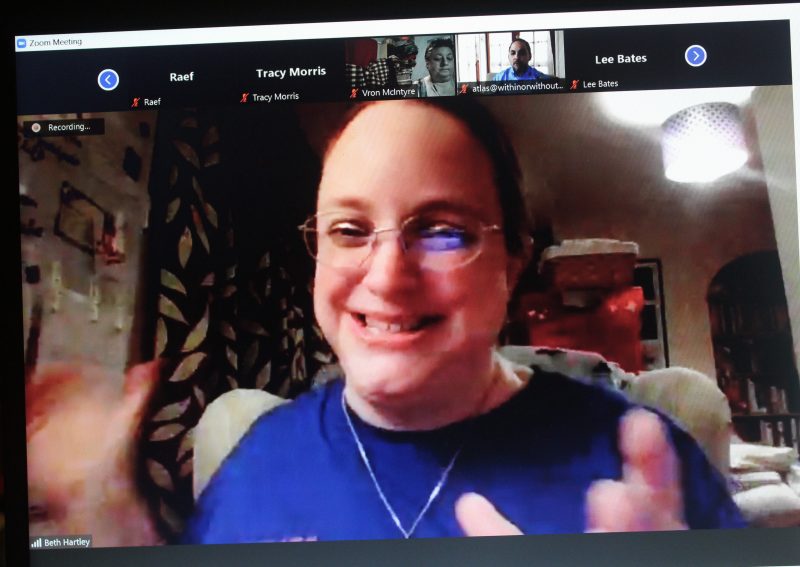INTERVIEW: FIRE & DUST MEETS BETH HARTLEY
WHAT IF STARS BY BETH HARTLEY
Allographic Press
ISBN 978-1909211223
£6.00/ 40 pages
My hostel heart
Feels the tightness of four walls and my chest.
Christmas from an over-hot hallway
but no one saying welcome home.
Fighting the darkness with cookies on Sinta Klaas and hospitality in threes;
Giving away what it cannot afford in hopes of blessing broken and battered
where others will not go
and the unknowing will never know.
My hostel heart
beats left wing, socially housed,
NHS healed blood with every beat.
Knows it’s existence is held tenuous, untrusted, grudging
by two words they want to erase
that are the safety in which I sleep
and the wall I kiss with every morning breath:
Lifelong tenancy.
My hostel heart
Runs laundry through the night, drives the car and speaks sharply to the staff nurse.
Because not everyone can do what you think and there’s about to be one more.
Because family is made in early morning walks and late night pain relief.
Because six months opened something that I pray will never heal.
My hostel heart
walks praying every footstep.
Cries out to every empty house;
Come home, come home, come home,
to everyone waiting and waiting, and waiting.
Every head on every temporary bed.
Every soul on street and surfed sofa,
until the world wakes up.
My hostel heart
lies open, lies awake from August to February.
The cycle running hot with shame and cold with despair,
but it pulses daily.
Pushing me through complacency and into a different struggle.
So that everyone comes home.
_____________________-‘#hostelheart’ from What If Stars, p.18

Beth Hartley is a poet and lives in Ely in Cambridgeshire with her family. She is part of the Fen Speak team, running and hosting Ely’s main poetry night, and is the independent organiser for High Street Poetry. Beth’s work has been published previously by Edgewords, Periwinkle Literary Magazine, Impspired Magazine and Idle Ink. Her debut poetry collection What If Stars was published in 2021 by Allographic. Beth describes herself as: “Poet of people and place; the transient and the eternal. I make: home, faith, work, words, and dinner. Itchy preacher, always Mama.”
On 14th October 2021, Beth was the guest headliner at our virtual Fire & Dust poetry night. We caught up with her after the gig, to ask a few questions…
HCE: Tell us a little about your journey as a writer so far. What inspired you to start writing poetry?
BH: I’ve written things, on and off for most of my life. I wrote poems and songs in my late teens and had a further phase of writing a lot of poetry from…1999-2003, when it seemed to dry up. In 2015 or so I found myself picking up my pen for poetry again and a series of particular circumstances meant I found my way first to Fen Speak, and then to Allographic. I’m not sure what started it except that it’s a way to say things and explore things I don’t get to do in other writing that I have to do. It’s a journey that continues to amaze me quite honestly. I consider myself incredibly fortunate to have the opportunities available to me that I have had and that I hope might continue.
HCE: What message(s) do you hope readers take away from your collection What if Stars?
BH: Oh! That’s not a question I’ve thought about beyond “I hope they like it” – but I think I hope it makes you think about the world you live in and the people you love and remember that they are wondrous. I hope it makes you think about the “what if….” of living.
HCE: Would you say there are themes or motifs that you tend to gravitate to in your work?
BH: What I write about has really changed over time – like peeling an onion, there are new layers to discover. I return often to the landscape though, and then people and relationships. I think I often take things that seem quite small – like someone commenting on how many books I have in my house – and then dig around in there for a while, see what comes out.
HCE: Some of the poems you shared focused on relationships with family. Is writing in the blood/did your relatives encourage you to pursue your literary dreams?
BH: I decided to write a novel when I was about 9?! Being a writer was a pipe dream for a long time but it was always in there I think. I didn’t know it was poetry though. I’m fortunate to have been encouraged in any and all my endeavours by my family and loved ones. I’ve been formed as a writer by the experiences I’ve had – other aspects of my life include writing and a certain kind of “performance” and though sometimes that frustrates me, I see very clearly what it’s given me and I’m grateful for most of it.
HCE: Who is your work aimed at – do you have an ideal audience in mind when you’re putting a poem together?
BH: Do you know I’m not sure? I think I start with whether it sounds like what I want to say about a particular thing. If someone was to read it would they get that impression from what I’ve written? Some pieces are directly written with performance in mind so I am thinking about a physical audience there – probably Allographic as most of my stuff goes out there first one way or another.

HCE: What is the most valuable thing you learnt during the process of putting your first collection together?
BH: I had to break the process into little, little pieces so I didn’t get overwhelmed. If you’re submitting, you have to be very mindful of what people want and then very patient for people to get back to you. I am the luckiest poet to have worked with my publisher, it’s been a joyful process. Be prepared to really think about your work and what it’s trying to say – to both bend and also to stick to what is true for you.
HCE: Your poem ‘Armour of Love’ nods to some pre-gig rituals. Tell us a little more about how you prepare for events, and do you have any tips for our readers about composing themselves to perform?
BH: Well, see in my not poeting life one of the things I am is a preacher and I’ve been one for a long time. So some of my rituals come from that – do I look decent or am I giving whoever is looking at me more ammunition! I like to smell nice, wear jewellery. My work life doesn’t have a lot of space for that kind of thing so it is also about marking that delineation as well. Those who know me well and see me often will know that I will probably be wearing things to make people feel close when I’m anxious. So perhaps earrings a friend bought me or something my daughter made? I have a yellow ring that was my grandmother’s that I wear a lot. Shoes that make me feel good, sometimes a garment my mum has made for me.
I’d say go feeling like yourself. Your style, your messages, the things that make you feel good in yourself.
HCE: What type of poetry do you seek out for personal enjoyment? As a reader/listener, when you engage with a poet’s work, what are you hoping to get out of it?
BH: Ooosh. Well, I love to listen to people I love and I love to be delighted by something new too. As a reader I’d still say that the collection that knocked me over the hardest was probably Jonathan Kinsman’s “Witness” – it came through my letterbox at the precise point when I needed it the most. We’ve had some wonderful poets at Fen Speak: Kaddy Benyon, Matthew Paul, John Greening come to mind. I could make a vast list – Giovanna MacKenna, Ken Cumberlidge, Matthias Ediger, all the regulars at Fen Speak who make me want to go out on cold nights. Leanne Moden probably helped me open up my brain, and Fay Roberts and Allographic have poured so much into it that I had to write more things down. Robin Lamboll and A.J. McKenna have the power of really good research and knowledge in a poem – where I want to stop the reading and go “sorry WHAT was that? Tell me again!”
HCE: Who or what would you say are the biggest influences on your poetry?
BH: I’ve learned an awful lot by watching how people craft. My Fen Speak co-pilot (Stewart Carswell) is like a woodworker in poetry and that’s a beautiful thing to me. I love being in Write Club – between us all, we jostle each other to do better, try new things, have a go. The creative tension for me between that and Allographic has become something special. I enjoy that in all those spaces we are different kinds of writers but all making space for that and using the different stuff we do to help each other. A dear friend said she knew when I’d been at Hammer and Tongue because it changed the rhythm of my writing and I know I pick up from the people and writers that I work with. Sometimes there is music in my head when I’m writing too.

HCE: What would you say is the best accident or unplanned event that has helped your writing journey/process?
BH: My first workshop. I was terrified. I’d never written “to order” before and I was so scared I would fail. So I did what any sensible person does in that scenario. I bought in stationery. And then I went to the workshop and wrote two poems in less than an hour and stared at them for weeks. But it made me sit up and take notice. Now I take my writing notebook everywhere. Make space for poetry and it will come.
HCE: It’s becoming a slightly better question to ask and answer, compared to earlier in 2021……what is next on the horizon for you? Are you already working on projects/booked for upcoming performances?
BH: We’ve got plans starting to grow for Fen Speak in 2022 which is exciting and a bit scary! This coming Wednesday, Stewart and I are doing a double header feature at Fen Speak because we both have books out. You can definitely talk to me about bookings…… I would love more books but I’m also trying to really revel in having this one. It is entirely a thing of wonder to me that I have it! Personally I want to keep writing and keep reaching, see what happens. I want to be in rooms with people for poetry again – to hear it and taste it. Hopefully I’m going to be on a podcast soon as well which is exciting because it’s one I like and listen to.
HCE: You’ve been engaged with the virtual poetry scene across the pandemic and UK lockdowns. What would your top piece of advice be, for poets who love open mics but find it a challenge to perform at online gigs?
BH: I have. I decided to try and make the best of it and see what happened. I was desperate to connect with people – being separated from my poetry family has been incredibly painful, especially as we were bereaved early on and could not be with one another. I’ve also taken the opportunities because in “real life” travelling for gigs isn’t easy for me because of home commitments. As for going to Zoom gigs, I’d go to some events and see how you feel, see where you think you could fit. Same as you would in physical space I suppose. Practically – if you’re not sure about Zoom or something then have a practice with someone perhaps. But also if online really is not for you, that’s OK too.

HCE: Is there anything we didn’t cover that you’d like to share with our readers?
BH: Buy books from living poets. Listen to Dead Darlings and Poetry Non-Stop because they are good podcasts. Have a go at writing things and see what happens.
HCE: What’s the best way for people to keep connected with you and your work?
What If Stars is available for purchase online from Beth.
